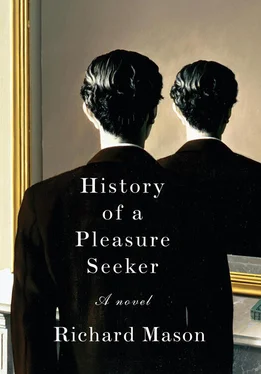Everyone on the little white yachts was scrupulously ignoring the two thousand people watching them and Jay could not return this greeting. For a moment their eyes saluted one another. Then Jay poked his tongue an inch through parted lips and turned away.
Piet was woken at first light by the laughter of revelers returning to the ship. At once he thought of Didier. He dressed and went to the trellised barrier where they had first met. His friend was often on early duty at the veranda café, which opened onto the first-class promenade deck. He would find him and behave quite naturally.
Not a soul appeared. Verignan’s party had gone off exceedingly well and none of his guests had gone to bed before dawn. Piet waited an hour by the barrier, to no purpose. He was about to go to breakfast when a woman in a floaty white dress appeared and sank gracefully onto a lounger on the other side.
It was Stacey Meadows.
The heightened sensuality of the last few days roared over him. She was staring out to sea, superbly self-possessed. He watched her furtively, having no means of reaching her. As he contemplated the defiant set of her chin against the vast ocean he thought of Don José’s fatal mistake: to bind himself to a person who did not understand him and never would. It was the same error his mother had made. He considered his amorous adventures thus far, not one of which was worth a lifetime’s devotion. Then he thought of the note Miss Meadows had sent him, which suggested an intelligence as self-determining and imaginative as his own.
He went to breakfast beset by an insistent desire that nothing — not Frau Stettin’s conversation nor the amorousness of Percy Shabrill and Miss Prince — could tame.
The last days of the voyage passed with agonizing slowness, the physical imperatives of Piet’s body competing with a mounting anxiety to which he had no answer. His sleep was fitful and he barely ate. What on earth would he do in Cape Town? He could think no further than his encounter with Miss Meadows, in which alone of all the uncertainties he faced he had the utmost faith.
On the morning of the final day, Table Mountain came into view through swirling mists. Despite the earliness of the hour the decks were crowded. Percy had proposed to Miss Prince the evening before and been accepted. He had kept Piet up all night talking of rings and houses and the style in which he intended to keep his wife.
Piet avoided them as best he could, having offered his congratulations over breakfast. The mountain ahead humbled him. It seemed the altar of a god or a deity itself: above the impudence of human contemplation. He returned to his cabin to find his bill waiting. Since his expulsion from first class he had found its habits hard to break and had resisted less and less the insidious pressure to buy things. Now he saw that he had been persuaded to consume eight cocktails and four brandies. He had had his tailcoat laundered in anticipation of its sale, and the amount charged for this service was many times greater than any sum he could hope to raise on it. He took from the safe the black steel box he had brought with him from Amsterdam and found its wad of notes far thinner than he remembered. At first he thought he had been robbed, but a few minutes with a pencil and a scrap of notepaper confirmed otherwise.
He recalled Didier telling him that a stroke of luck is not the same thing as being rich. The extravagance of his ticket, a night at the Karseboom, the sleeper to Paris, his hotel there, taxis to transport his wretched trunk, and now his wasteful expenditure on the ship had drastically depleted Maarten Vermeulen-Sickerts’ gifts. For a horrifying moment Piet thought he might not be able to pay the account. What ignominy to have to borrow from Percy! He counted the notes with dread, and when he had separated what he owed only three remained.
He went on deck again. A blazing heat had incinerated the mist. Ahead of him was a chaotic port — foreign and energetic and wholly indifferent to him. He could barely survive a fortnight on his remaining reserves. What then? He did not know and could not think.
He found a deck chair and sat heavily in it, hiding from the daunting view. He heard the anchor break the water and a bell ring. With a shudder that made the ladies sway, the engines went into reverse and the boat stopped. His anxiety intensified. He knew that confidence alone could save him, but his capacity to manufacture it had deserted him. The band began to play “La Marseillaise.”
“At long bloody last. Land!” Percy Shabrill was upon him, absurdly dressed in a tweed suit and plus fours — as if for a golfing holiday in the north of England. Having sold eighteen refrigeration systems and seduced a woman right beneath his cabinmate’s nose, he was inclined to be generous with Piet Barol. “As soon as Dotty and I are settled, you must visit us.”
Piet knew that this might be his only refuge from the doss-house and the realization was bitter indeed. Nevertheless he thanked Percy and took down his brother’s address in Johannesburg.
“Just look at all those darkies. Enough to give you nightmares.”
And with that Percy was gone.
The decks began to clear. Heat and fear made Piet dizzy. At length he went below. A steward appeared. “Letter for you, sir. Stand by for disembarkation.”
Piet did not wait. He felt that another encounter with Percy Shabrill would break him. He pushed his way to the vestibule doors, glad that Didier had written to him. He was badly in need of a friend. As he stepped onto the gangway he saw Didier standing on the quay, directing the first-class passengers towards the customs shed. “Loubat!” His voice carried over the swell of noise.
Didier recognized it and turned deliberately towards its source, as if putting his hand into a flame. Years of training allowed him to keep his face absolutely expressionless as he looked for the last time at Piet Barol. Then he shook his head and went into the shed.
The swell of the crowd could not be restrained. It carried Piet to the end of the gangway and onto land that rocked disconcertingly after nearly three weeks at sea. Only the alchemy of friendship might have transformed this disaster into an adventure. The sudden revocation of Didier’s was crushing. Piet joined the throng at the passport window and took the letter from his pocket. Perhaps Didier had explained. But the note inside the vellum envelope was not from Didier Loubat. It read: Find elegant premises in the best district. Take a room at the Mount Nelson hotel and introduce yourself widely. Exploit your European glamour. Good luck. J.G. and was accompanied by a check for a thousand pounds.
I hope it’s not a love letter you’re reading with such radiant concentration.” Stacey Meadows was standing beside him in a dress of peppermint-green satin. “I should be rather jealous if it were, though I’d forgive you if you’d let me join the line. I was late getting off and I’ve lost my parasol. I can’t stand in the sun with this mob.”
“It would be an honor, Miss Meadows.” He offered her his arm.
“You do look pleased with yourself.”
“Only delighted to run into you.”
“My invitations are not often ignored.”
“I tried to come but was prevented. May I explain over luncheon?”
They went together to get their luggage. Stacey had a great deal more than Piet. A Loire Lines porter took it for them to the customs hall where an official asked for their papers, taking them for man and wife. Piet handed over the passport his mother had given him long ago. Stacey Meadows presented hers. When both had been stamped she said: “I couldn’t possibly lunch with you. I don’t even know your name.”
“Well, that is easily solved.” He took her hand and kissed it. “My name is Pierre Barol.”
Читать дальше












